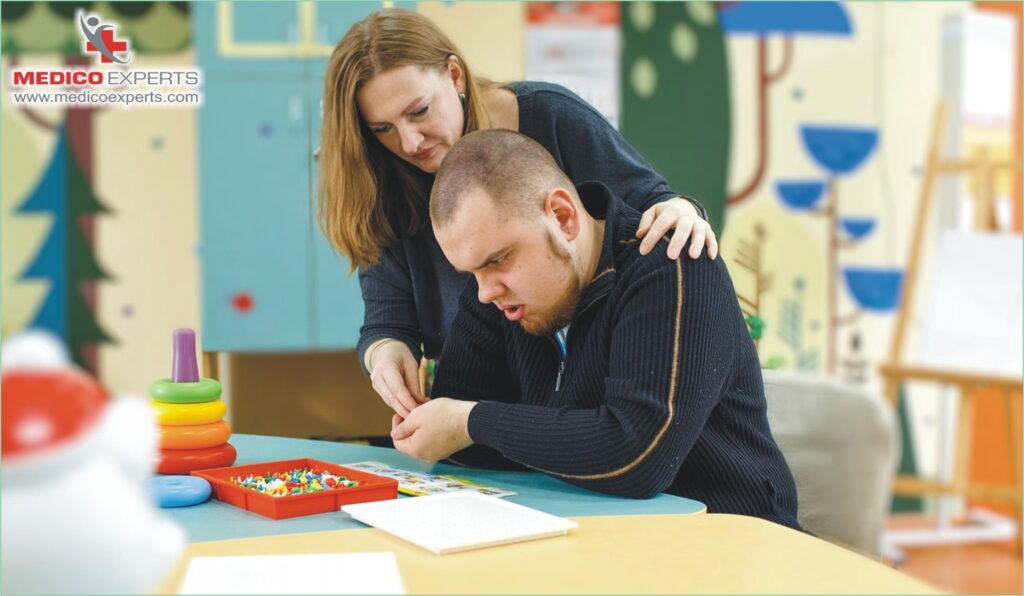Are you deeply concerned about your child’s future and anxious thinking whether they live a self-reliant life like their peers?
Parents of autistic children will always have this question in their mind “Can my autistic child become normal”.
Autism spectrum disorder is a complex developmental condition. However, a study has found that early autism may not last a lifetime.
There are therapies to help your child participate in normal social and professional activities. Continuous planning, testing, and assisting children to adapt to the environment they are in can help them to lead a normal life.
What are the Symptoms of Autism Spectrum Disorder (ASD)?

People who have ASD struggle with social interaction, communication, and speech. Let’s check in detail the common symptoms of Autism Spectrum Disorder.
- Avoid eye contact
- Don’t show any facial expression when they are happy, sad or excited
- Doesn’t respond to names by 9 months of age
- By 12 months, they use few gestures
- Don’t interact with people for 15 months.
- Doesn’t show interest in simple interactive games
- Don’t do role play (acting like a teacher or superhero) by 4 years of age
- Don’t show if something is interesting happening by 18 months
- Doesn’t notice or pay heed if somebody is upset or hurt by 2 years
- Do not join other kids to play by 3 years of age
As soon as you see some or many of these symptoms in your child, you should approach a child psychiatrist or psychologist, pediatric neurologist, or developmental pediatrician.
But along with that, you should offer all the support they need. Let’s learn about them in detail:
Can Autistic Child Become Normal?

Yes, with timely interventions, therapies, and support, an autistic child can develop essential skills to lead an independent and fulfilling life.
Early diagnosis, combined with personalized strategies like Applied Behavior Analysis (ABA), speech therapy, occupational therapy, Ayurveda, Homeopathy and Stem cell therapy can significantly improve outcomes.
While autism cannot be cured, these interventions empower children to thrive socially and professionally, bridging the gap between their abilities and societal expectations.
There can be significant improvements in the symptoms which in turn will help them to live an independent life. Helping them learn new things, making them efficient enough to get employed, and teaching them how to live independently can ensure that they live a normal life.
The following steps are for continuously checking the progress of your child and to help them lead a normal life:
Step 1: Understanding Autism and its Diversity

Autism is a spectrum disorder, which means it manifests differently in each child. To support them effectively, you must grasp the individuality of their condition. Start by:
1. Seeking Professional Diagnosis
If you suspect your child might be autistic, consult a healthcare professional who specializes in autism for a formal diagnosis. This is the first step in understanding your child’s unique needs.
2. Learning About Autism
You need to learn about autism to understand what types of challenges your child may face in the future. When you know their challenges you can provide better support to them.
Step 2: Early Intervention and Therapies

You need to understand the fact that early intervention is important for an autistic child’s development. Following are some of the steps you can take once your child is diagnosed with autism:
1. Therapies
There are therapies like Applied Behavior Analysis (ABA), speech therapy, and occupational therapy that you can use to help your child fight the challenges of autism. These therapies can help your child overcome the challenges that they face due to autism and develop essential skills to overcome the challenges.
2. Individualized Education Plan (IEP):
You can also work with your child’s school to create an IEP that caters to their needs. This is a way to make sure that your child gets the support they need at their school.
3. Consistent Routine
As per experts, Autistic children often thrive in structured environments. That’s why you should have a daily routine to provide stability in your day-to-day life and reduce anxiety.
Step 3: Communication Skill Development

You can use speech therapy to boost the communication skills of your child. Taking help from a physical therapist can also improve their handwriting legibility.
Above all, you need to keep a tab on their progress consistently using communication tests to ensure that these therapies and supports are boosting their skills.
You can do the following things to keep a tab on the progress of your child:
1. Observation
You need to observe their interactions and note improvements in eye contact, gestures, and vocalizations.
2. Structured Assessments:
There are communication assessments that are specially designed for autistic children to evaluate their language and social communication abilities.
3. Consult Professionals
You can also consult speech therapists or psychologists who can perform evaluations that will give you more clarity about your child’s communication skills.
You need to regularly monitor and adjust the child’s communication plan based on these assessments to make sure that there is progress in your child’s communication skills.
Step 4: Testing to Know the Interests of your Child

Most autistic children have highly focused interests in different subjects. You need to understand where your child’s particular interests lie and encourage them to develop skills as per their interest. You can provide your child with vocational training to develop their skills in their subject of interest.
Step 5: Community and Social Skill-Based Training

Autistic children have communication issues and because of that, they fail to make friends and talk to people around them. Not having friends and people to talk to may make them feel isolated and depressed.
That’s why, you should encourage your child to talk and interact with people. Interacting regularly with people will help them gradually become more comfortable socializing with people around them.
You can do that by asking your relatives and friends to introduce themselves with a smile. This will help your child overcome their fears and interact with them by sharing their name. This simple technique can help your child build their social skills.
Besides, you can give your child stem cell therapy to overcome the issues related to autism.
Stem cell therapy is safe and effective for autism treatment. It has shown some positive outcomes in boosting cognitive, learning, and behavioral abilities in autistic children. These cells’ capacity to transform into nerve, brain, and muscle cells makes them effective in autism treatment and the therapy has a success rate of up to 85%.
Step 6: Helping them learn to live independently

Your worries about your child living an independent life can be addressed with occupational therapy.
Occupational therapists can help support your child to develop essential life skills. They guide and assist your child in daily activities such as bathing, cleaning, eating, dressing, walking, and sleeping. In short, you can work towards giving your child an independent future with the help of occupational therapists.
Step 7: Helping the Autistic Adults with Employment

Nowadays governments have come up with special programs to employ people with certain physical and mental disabilities.
An adult with autism needs help and proper support to overcome social anxiety, difficulty in collaboration, difficulty in coping with criticism, and difficulty in communicating in the workplace.
If you have an autistic adult who needs employment, think about these points:
1. Identify Strengths and Interests
You need to recognize the unique strengths and interests of the autistic adult in your family and accordingly, you should tailor job opportunities to align with their abilities, preferences, and passions.
2. Skills Development
You need to offer vocational training and skill-building programs to enhance the autistic adult’s employability. While doing so, you should focus on communication, social interaction, and task-specific skills.
Step 8: Housing Options for Adults with Autism

You need to plan properly before getting accommodation for your autistic child. There are specialized accommodations designed for autistic people. These accommodations help them connect with peers who understand their challenges and support each other in living independent and fulfilled lives.
But before arranging such accommodation, you need to keep the following points in mind:
- Access to behavioral and mental health support.
- Integration of communication support.
- Opportunities for social engagement.
- Assistance in career development.
How Can Stem Cell Therapy Help Autistic Children?
Stem cell therapy offers promising results in autism treatment. By regenerating damaged cells, stem cells improve cognitive, learning, and behavioral abilities in autistic children. With up to an 85% success rate, stem cell therapy has helped children overcome communication barriers and achieve milestones.
Takeaway

Autism is not a limitation. With the right support, early intervention, and therapies, your child can lead a meaningful, independent life. While there’s no cure, treatments like Combination therapy provide effective solutions to manage challenges and improve quality of life.
At MedicoExperts, we connect you with the best autism specialists and stem cell therapy providers in India. Take the first step toward empowering your child today.
Frequently Asked Questions (FAQs):
Q1. Can level 1 autism be cured?
A. Level 1 autism is the mildest form of ASD but you should remember that any level of autism is not curable. Nevertheless, if your child or family member is autistic, they can live a normal and independent life with proper support and treatments.
Q2. Can mild autism go away?
A. Any form of autism does not go away but experts have found that some children who get early treatment, therapies, and support show dramatic improvements and drastically overcome the challenges related to autism spectrum disorder.
Q3. Will my autistic child ever talk?
Experts have found that even after age 4, many non-verbal children with autism have developed language. So, you need to be optimistic and offer all the support, care, and therapies to your child for speech development.
Q4. At what age will an autistic child talk?
It is obvious for you as a parent to worry about your autistic child’s speech. But the good news is your child may talk soon, as a study has shown that some children who were not talking by the age of 4 to 5, developed speech after the age of 5.
Q5. Can autism be cured?
Autism cannot be cured but an autistic child can live an independent normal life like their peers with the right intervention at the right time.
Q6. Can an autistic child study?
Children with autism can study. The learning abilities of an autistic child vary. Some of them need special education classes while others need advanced learning opportunities that help them stay engaged in the classroom.
Q7. How to teach an autistic child?
Teaching an autistic child will be different from a normal child depending on their condition. Check these tips for teaching them:
1. The classroom can be hectic for normal children and ASD children can be overwhelmed by it. Teachers can help them from sensory overload (too much noise, too many lights) in the class.
2. The teacher and parents need to be clear while giving them directions, asking questions, and giving feedback. ASD children already have communication challenges and if you as a teacher or parent are not clear while giving instructions to them, you may further enhance their challenges.
3. Help them inculcate reading habits. Encouraging them to read, as reading comprehension can boost communication skills.
Q8. At what age will an autistic child talk?
At what age an autistic child will talk, depends on the child and their condition. Some learn to talk early and some even learn to talk after age 5.
References
- https://www.nu.edu/blog/4-teaching-strategies-for-students-with-autism/
- https://www.kennedykrieger.org/stories/interactive-autism-network-ian/speech_onset_study#:~:text=The%20study%20brings%20hope%20to,do%20get%20language%2C%22%20Dr.
- https://www.ncbi.nlm.nih.gov/books/NBK565908/
- https://www.ncbi.nlm.nih.gov/books/NBK565908/https://www.ncbi.nlm.nih.gov/books/NBK565908/
- https://www.nih.gov/news-events/nih-research-matters/early-autism-may-not-last-lifetime
- https://economictimes.indiatimes.com/jobs/government-jobs-for-those-with-learning-disabilities-too/articleshow/62643622.cms?from=mdr
- https://www.autismspeaks.org/life-skills-and-autism
- https://www.ncbi.nlm.nih.gov/pmc/articles/PMC9114801/
- https://onlinelibrary.wiley.com/doi/10.1002/jdn.10304
- https://www.webmd.com/brain/autism/individualized-education-programs-ieps-for-autism
- https://www.webmd.com/brain/autism/therapies-to-help-with-autism
- https://adult-autism.health.harvard.edu/resources/getting-an-autism-diagnosis-as-an-adult/#:~:text=A%20psychiatrist%20(MD)%2C%20psychologist,basis%20of%20an%20autism%20diagnosis.
- https://www.nih.gov/news-events/nih-research-matters/early-autism-may-not-last-
Relevant Articles For You
Signs of infantile autism can bring a lot of worries to the mind of the parents. Your child may not be able to perform…..Read More
As a parent of an autistic child, you may fear that your child may be bullied or treated differently in society. You may also fear that…..Read More
As a parent of an autistic child, your dream is to help your child get rid of hyperactivity and overcome the lack of…..Read More
Recommendations To Understand Different Treatments
Are you worried that your child’s autism symptoms have not improved despite your best efforts? You may be annoyed by the…..Read More
It is an unbearable pain to see a 3-year-old child not making eye contact with you or not smiling back at you. Like other parents, you…..Read More
Medically Reviewed by MedicoExperts Editorial & Clinical Review Board
Medical Disclaimer: This content is for informational purposes only and is not a substitute for professional medical advice, diagnosis, or treatment. Always consult a qualified healthcare provider for personalized guidance.



